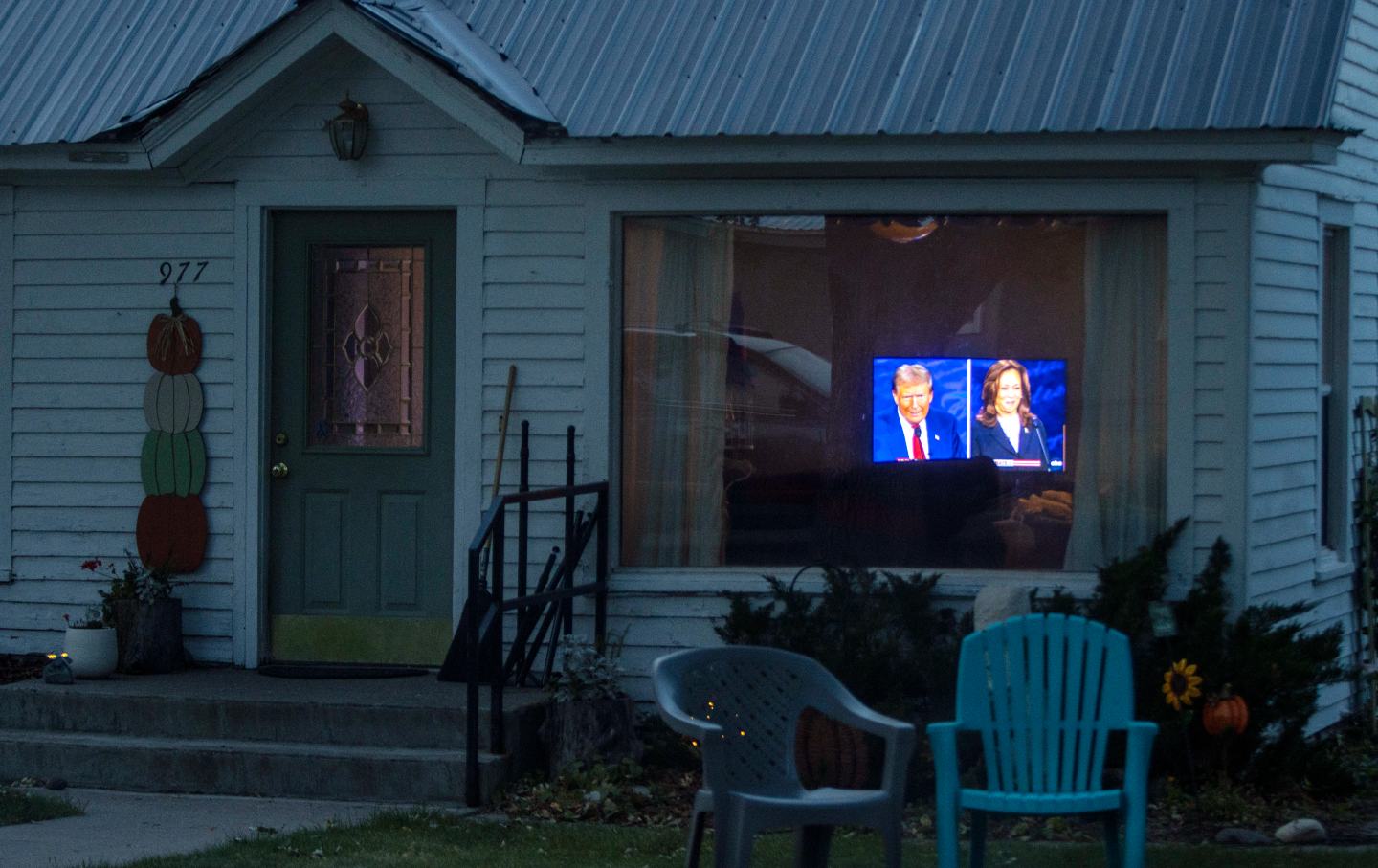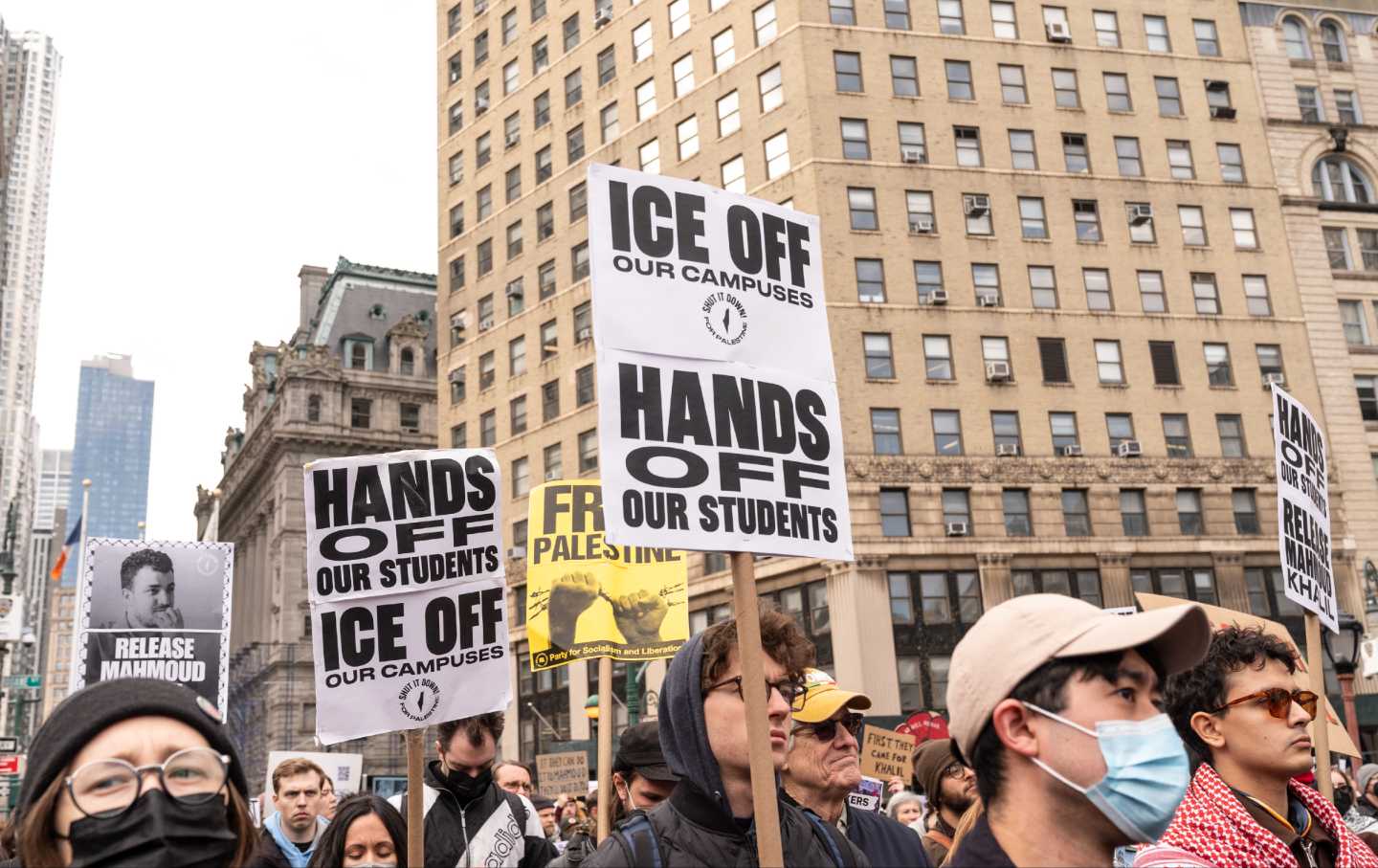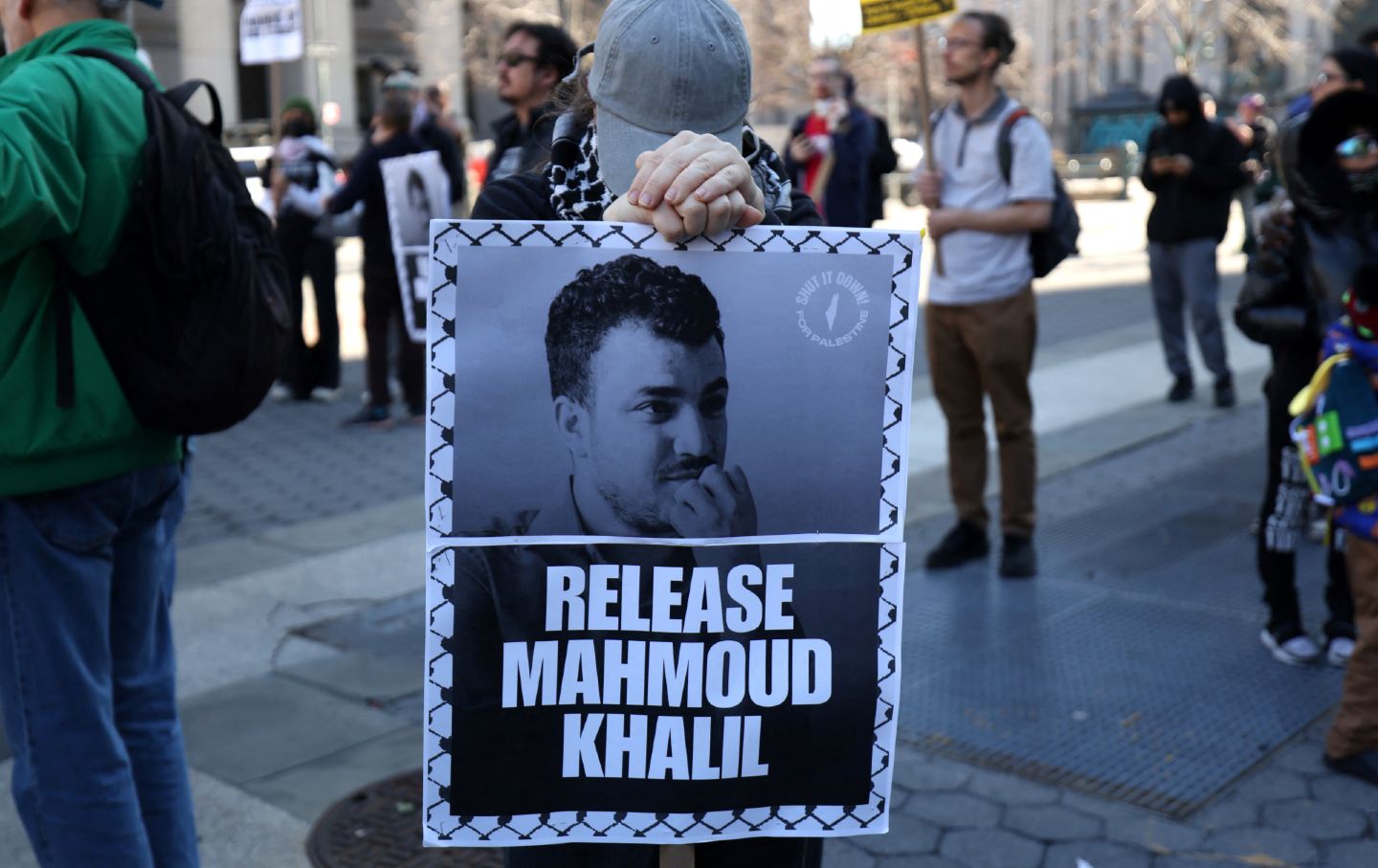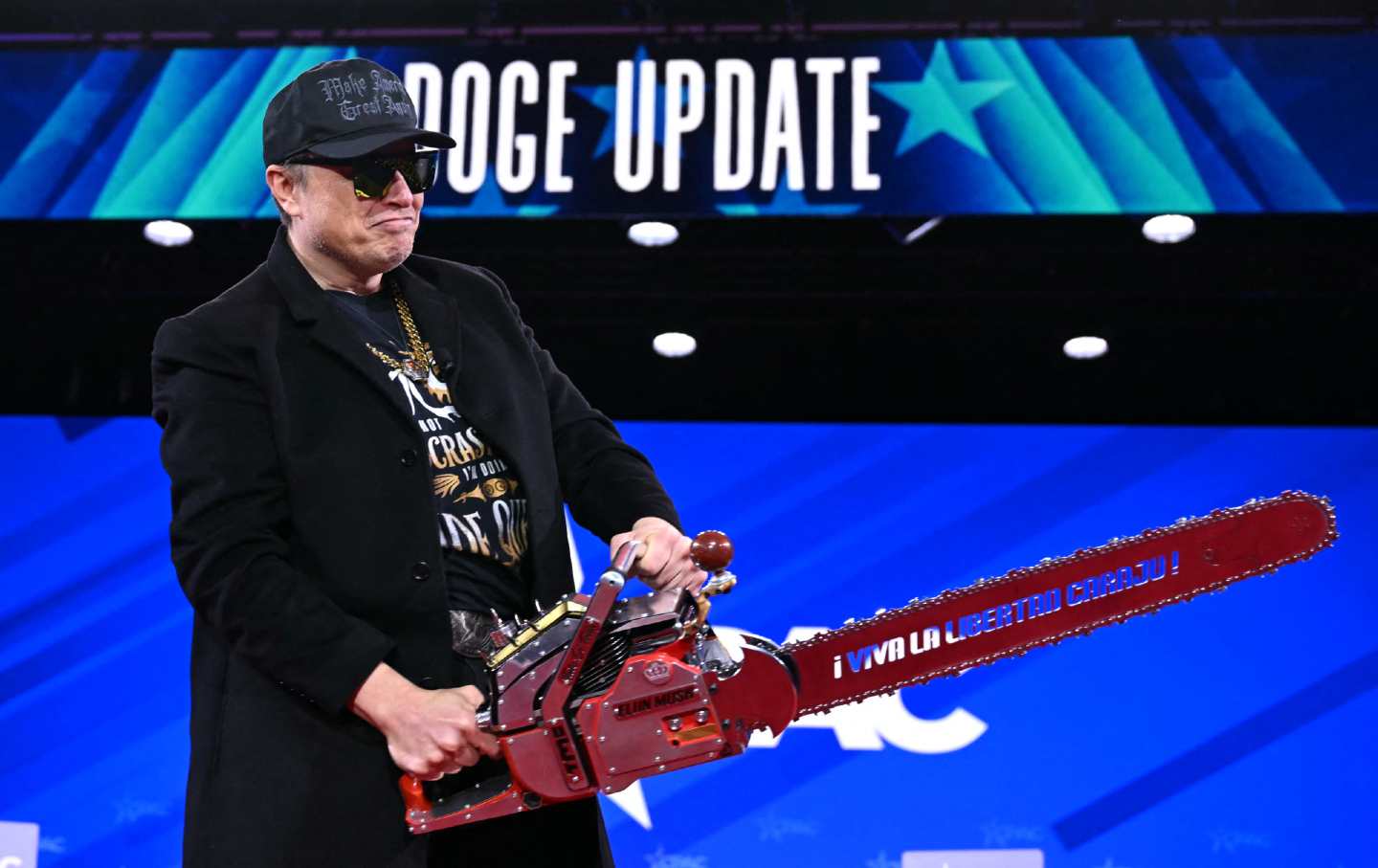For Harris, Housing Takes Center Stage, but Tenants Are Not the Audience
Harris has emphasized housing during her campaign more than most Democrats in recent years—but her policies rarely include the words “renters” or “tenants.”

A television showing Democratic presidential nominee Vice President Kamala Harris debating Republican presidential nominee former president Donald Trump is seen playing in a living room on September 10, 2024, in Ashton, Idaho.
(Natalie Behring / Getty Images)
There are well over 100 million tenants in this country. But listening to Vice President Kamala Harris’s key talking points over the last month, you wouldn’t know that.
As those who watched the debate last week will have probably noticed, Harris has made the housing crisis and its potential fixes central to her campaign strategy. Yet, throughout both her nomination-acceptance speech at the DNC and her remarks during the debate with former president Donald Trump, she did not mention “renters” or “tenants” a single time. She rarely, if ever, even says those words in her rallies across battleground states.
Yet tenant advocates breathed a momentary sigh of relief on July 30, when, at an Atlanta campaign stop shortly following President Joe Biden’s exit from the presidential race, Harris seemed to signal that she backed his proposed rent cap policy. “We will take on corporate landlords and cap unfair rent increases,” she said to raucous applause.
Biden’s policy, which he unveiled about two weeks prior to that event, would require landlords owning more than 50 dwelling units to restrict annual rent increases to 5 percent in order to obtain key tax write-offs, which would impact an estimated 20 million rental units. As written, the policy hinges on congressional approval, which has effectively kicked the can down to an upcoming Democratic term given Republicans’ control of the House. In other words, without Harris’s support, the proposal is dead, and so the Atlanta pronouncement has become the sole thread by which tenants’ hope for federal rent stabilization now hangs.
This proposal came on the heels of an administration marked by friendlier-than-average tenant policies, from taking the crucial step to enact an eviction moratorium—albeit disastrously short-lived—when Covid was at its peak, to providing millions in funding to tenant organizations, to drafting a “Blueprint for a Renters Bill of Rights” last year. The Harris campaign, even as it positions the housing crisis as one of its main targets, promises a different approach: She plans to significantly expand on Biden’s home-building efforts while simultaneously seeking to take a much-needed prosecutorial approach to some of landlords’ tried-and-true price gouging techniques. Direct tenant protections, though, are falling to the wayside, with her words at the Atlanta rally now standing out as the sole exception.
This shift comes even as the Biden-Harris administration’s commitment to rent caps has already rung hollow: Every day they’ve been in power, the administration has had the authority to enact a rent cap proposal without Congress (the proposal would only impact landlords who receive taxpayer money from the Federal Housing Finance Authority, which is overseen by the executive branch). The administration even used the FHFA in July to unilaterally enact new tenant protections like a five-day grace period before landlords can impose late rent fees. Biden, and Harris, clearly know they have the power to do the same with rent caps already, but have made an active choice not to, weaponizing it as a reason to elect future Democrats instead.
So, like it or not, the policy now hinges on Harris. But in the weeks since Atlanta, her position has gotten murkier, as she’s avoided any mention of rent caps altogether, signaling that what Biden has proposed could very well die with a Harris presidency.
In both a press release detailing some of Harris’s major plans for her first 100 days in office and the still sparsely adorned “Issues” section of her campaign website, the word “cap” has vanished from her housing policies. At last week’s debate, rent control didn’t feature in Harris’s policy highlights, even as her conservative policies like protecting fracking, hiring more border police, and ensuring that America has the “most lethal fighting force in the word” got plenty of airtime. Given the campaign’s insistence on keeping Harris far away from gaggles of reporters with pesky policy questions, it’s at present unclear exactly what Harris means when she says she will “take on corporate landlords.”
Even as she has largely avoided the nitty-gritty details of a housing policy altogether, it’s worth commending how much time—much more than any general election candidates in recent memory—Harris devoted to the housing crisis in her debate responses last week. Among her stated promises were overseeing the construction of 3 million new homes and rentals by the end of her first term, as well as offering $25,000 in down-payment assistance to first-time homebuyers. It is possible, of course, that the latter policy will only increase the cost of homes, resulting in either no benefit to cost-burdened tenants or only a slight improvement in a roundabout way by lowering the barriers keeping tenants from becoming homeowners (or, as some tenant organizers call them, “bank tenants”). In the case of the 3 million homes, her promise is not one of immediate relief but rather that new homes, to be available at suspiciously unspecified levels of affordability, could lower rents years down the line. Harris’s campaign is therefore leaving tenants—a population that outnumbers the sum of Biden’s 2020 voters by the tens of millions—to wonder how her presidency might directly improve their conditions.
The crisis Harris will inherit should she become the 47th president demands more than this.
At least 22 million renter households, a record and nearly half of all renters, are cost-burdened, meaning they put more than 30 percent of their income toward rent. Severely cost-burdened tenant households (those putting 50 percent or more of their paycheck toward rent) are also at record numbers, increasing in rank by 1.5 million since 2019 and now surpassing 12 million households. This should hardly be a surprise, because while median rents have risen 21 percent in inflation-adjusted terms since 2001, median renter household incomes have risen just 2 percent. Landlords bludgeon countless tenants with $100 or more increases every year, and for every $100 increase in average rent, homelessness increases by 9 percent, according to the Department of Housing and Urban Development.
For years, these tenants have been sounding a rallying cry: The rent is too damn high! For a moment, it seemed like the Biden administration was starting to hear them. But as November approaches, the question remains: Is Harris listening, too?
On August 16, Harris released a policy memo that provided a first official look at what her housing response would look like should she become president. The second of her three major housing plans listed in the memo is titled “Lowering the Rent for Hardworking Americans by Taking on Corporate and Major Landlords,” and includes the suggestion that “Vice President Harris and President Biden” will “make sure corporate landlords can’t use taxpayer dollars to unfairly rip off renters.” While this is clearly referencing Biden’s rent cap proposal, the language is much less explicit than her “cap unfair rent increases” line from the month prior.
At best, this change could be seen as an effort to avoid hot-button rhetoric. At worst, it’s an outright snub of the proposal—and seems to imply the Harris campaign believes there is a fair way to rip off renters.
The other proposals she lays out in the memo include going after services like RealPages—a real estate company being sued by the Department of Justice for allegedly helping landlords collude with one another to gouge tenants on prices—and removing tax benefits for predatory real estate investors who buy up homes in bulk. But neither of those policies will actually prevent rent from rising in and of themselves. They just take away some of the many tools landlords have been using to do so. And if the way landlords used the disarray of the pandemic as an opportunity to hike prices through the roof is any indication, they will surely find new and creative ways to raise rents so long as nothing or no one stops them from doing so.
Earlier this month, the Harris campaign finally caved to mounting public pressure to present a vision for the presidency beyond “I’m not Donald Trump.” At long last, an “Issues” tab appeared on her official website. Housing policy features here prominently, appearing second on the list provided, following only Harris’s promise to cut taxes for the middle class. But when it comes to rent caps and tenant protections, the only explanation included is vague at best: “Vice President Harris knows rent is too high and will sign legislation to outlaw new forms of price fixing by corporate landlords.”
At the last debate, Harris referenced, in explicit detail, two of the three policies laid out in her August press release (building 3 million more homes and providing down payment assistance). But the one tenant organizations have actually been advocating for—“lowering the rent”—was the only one that didn’t make the cut, likely because the campaign has no direct plan in place to do it.
In Harris’s home state of California, the campaign behind “Yes on 33,” a referendum on the November ballot that would repeal existing state law in order to allow local governments to pass rent control measures if they so choose, posted an ad on YouTube that included Harris’s promise from the Atlanta rally to cap rents. In the ad, Harris appears heroic, framed as a rent control advocate. For a campaign that at one point claimed to support rent caps, the referendum’s proposal should be uncontroversial: It will not enact rent control outright but rather lift an existing ban on it. But after Politico reached out to the California campaign to ask if Harris had endorsed “Yes on 33,” the ad was taken down, and the rereleased version included the disclaimer: “Use of Kamala Harris’ likeness and words does not imply endorsement.” (“The Harris campaign did not authorize use of footage for this advertisement,” a Harris spokesperson told Politico in a statement.)
Meanwhile, what seems to be atop Harris’s list of housing priorities is how she plans to “build three million more rental units and homes that are affordable to end the national housing supply crisis in her first term.” Her plan includes a first-of-its-kind tax incentive for building homes for first-time homebuyers, a $40 billion investment for local governments to fund new housing projects, and plans to “cut red tape” that slows the process of converting existing buildings into housing. But the question Harris has yet to answer is the most important: affordable for who?
Under the Biden-Harris administration, new housing is already being built and completed at record numbers, according to Harvard’s Joint Center for Housing Studies’ 2024 “State of the Nation’s Housing” report. The report found that “449,900 new multifamily units hit the market in 2023, a 22 percent increase from the previous year and the highest number of completions in more than three decades. Completions will likely remain elevated at least for a time, as 950,000 multifamily units were under construction in March 2024, just shy of the record high of over 1 million units reached in 2023.”
The vast majority of these new units, however, are well out of reach of the tenants most in need of their arrival. The Joint Center found that the median asking price for units completed in the last quarter of 2023 was $1,710: a 19 percent increase since 2014. This monthly sum would cost-burden a household making $68,400 per year, higher than the median income for both Black and Hispanic households, and drain at least half the income of the millions of households making $41,040 per year or less. Meanwhile, between 2012 and 2022, this country lost 6.1 million units that charged less than $1,000 in rent, including over 2 million that were once less than $600. The Joint Center attributed much of this loss to “rent increases among existing units.” If newly builts units are asking for rents that would severely cost-burden the tenants who most need relief, and the units these tenants can afford are being rapidly hiked out of affordability, where, exactly, does this proposal leave them?
The Harris campaign has not yet put forward an answer to this question because, well, they haven’t been forced to. But looking at some of her campaign appearances, there are worrying signs that her policies aren’t even meant to benefit the tenants most vulnerable to her campaign’s new corporate landlord targets. Her language when describing her housing supply policy, which she claims will lower rents, has been inconsistent. At some rallies, she assures audiences that “we will end America’s housing shortage by building 3 million new homes and rentals that are affordable,” while at others, she is more specific and tacks on “that are affordable for the middle class.” It goes without saying that there are plenty of tenants living below what we’d call “the middle class” in need of affordable housing, many of whom will soon be priced out into homelessness in the absence of it.
During the debate, Harris also emphasized that she would “work with the private sector” in order to produce the 3 million homes she wants by the end of her first term. While working with the private sector is one of our system’s more maddening guarantees, there is significant reason to believe that the biggest beneficiaries of her supply policy will be developers, who wind up with the contracts to build and rent out these properties. Since 2019, private-sector landlords are also the ones who have raised rents by 30 percent.
So by all means, let’s rely on them to change their ways.
Unlike her modern general election predecessors, Harris’s campaign is putting housing at the forefront of its mission. But while her repeated lambasting of this crisis and “corporate landlords” is a welcome step in the right direction, her murky solutions indicate she is still not really listening to the tenant class. This could prove a careless mistake, as cost-burdened tenants make up a massive portion of the Democratic Party’s base (and the electorate in general). The number of tenants living in cost-burdened households outnumbers, at a minimum, the sum of registered voters in Ohio, Pennsylvania, Michigan, and Wisconsin combined. If Harris took a bolder approach to enact legislation that protects them directly, it would almost certainly be electorally popular in battleground states: 70 percent of swing-state voters, along with 79 percent of Black voters, say they would be more likely to support a candidate who supports rent stabilization.
It’s important to remember, though, that the number of cost-burdened tenants reached its record high under Biden and Harris’s watch, and that policies like rent caps are just the floor of what this housing crisis demands. In the first quarter of 2022, rent increases hit their highest ever, at over 15 percent annually. Even if Harris decides to enact Biden’s proposed 5 percent rent caps, that won’t do a thing to undo those outrageous hikes, which landlords got away with during her tenure as vice president.
Instead, the ceiling of Harris’s plans seems to be minimizing the tenants who could become cost-burdened in the future, rather than repairing harm that has already been done to the tens of millions that population already includes.
There is also of course the risk that the promises the Harris campaign is making turn out to be empty ones. After all, she changed her mind about supporting Medicare for All, changed her mind about an electric vehicle mandate, and changed her mind about decriminalizing border crossings, among others. The promise at her Atlanta rally could very well become another entry in the graveyard of her reneged progressive proclamations.
Ultimately, all of this uncertainty could be solved with a simple, clear statement, along the lines of: “During my first term, I will enact the Biden administration’s proposed legislation to cap annual rent increases at 5 percent” (or ideally, even lower). Yet her quiet avoidance of rent control, or really any direct tenant protections at all, as a candidate means that for all Harris’s increased attention to the housing crisis, she still is not answering the demands of those who have faced the brunt of its havoc.
Tenants will keep making those demands until she does.
Support independent journalism that exposes oligarchs and profiteers
Donald Trump’s cruel and chaotic second term is just getting started. In his first month back in office, Trump and his lackey Elon Musk (or is it the other way around?) have proven that nothing is safe from sacrifice at the altar of unchecked power and riches.
Only robust independent journalism can cut through the noise and offer clear-eyed reporting and analysis based on principle and conscience. That’s what The Nation has done for 160 years and that’s what we’re doing now.
Our independent journalism doesn’t allow injustice to go unnoticed or unchallenged—nor will we abandon hope for a better world. Our writers, editors, and fact-checkers are working relentlessly to keep you informed and empowered when so much of the media fails to do so out of credulity, fear, or fealty.
The Nation has seen unprecedented times before. We draw strength and guidance from our history of principled progressive journalism in times of crisis, and we are committed to continuing this legacy today.
We’re aiming to raise $25,000 during our Spring Fundraising Campaign to ensure that we have the resources to expose the oligarchs and profiteers attempting to loot our republic. Stand for bold independent journalism and donate to support The Nation today.
Onward,
Katrina vanden Heuvel
Editorial Director and Publisher, The Nation
More from The Nation

“I’m Terrified”: Trans-Feminine Athletes in Their Own Words “I’m Terrified”: Trans-Feminine Athletes in Their Own Words
In part two of a series, trans women athletes describe what it’s like to compete in the Trump era.

Columbia Is Betraying Its Students. We Must Change Course. Columbia Is Betraying Its Students. We Must Change Course.
The administration is choosing complicity over courage in the case of Mahmoud Khalil. It’s time for the faculty to demand a new path.

The Trans Cult Who Believes AI Will Either Save Us—or Kill Us All The Trans Cult Who Believes AI Will Either Save Us—or Kill Us All
What the Zizians, a trans vegan cult allegedly behind multiple murders, can teach us about radicalization and our tech-addled politics.

We Are Asking the Wrong Questions About Mahmoud Khalil’s Arrest We Are Asking the Wrong Questions About Mahmoud Khalil’s Arrest
The only relevant question is not “How can the government do this?” It is “How can we who oppose this fascist regime stop it?”

DOGE’s Private-Equity Playbook DOGE’s Private-Equity Playbook
Elon Musk's rampage through the government is a classic PE takeover, replete with bogus numbers and sociopathic executives.

White Flops Rejoice! White Flops Rejoice!
DEI is being snuffed out in DC. Mediocre whiteness reigns. And we’re all going to suffer for it.


